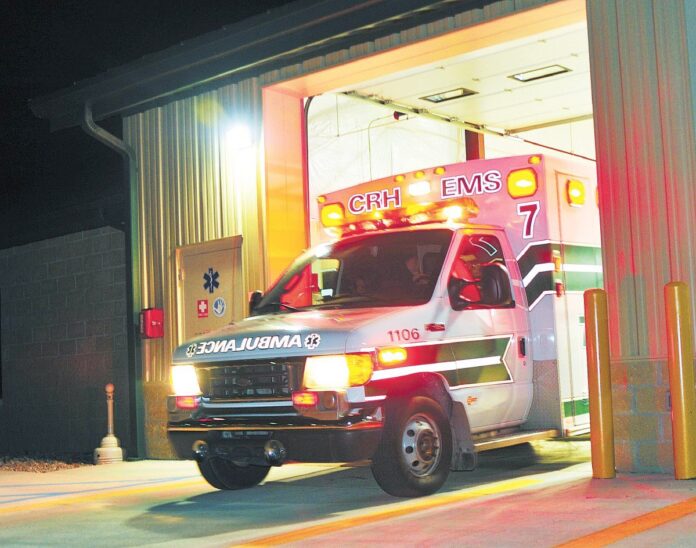
The Brown County Commissioners are going back to the drawing board to find a solution to expensive ambulance service for the county.
The current ambulance contract expires at the end of this year, but there will not be a lapse in service, according to the current provider, Columbus Regional Health. The commissioners plan to work the next three months on creating a new contract.
For years, Columbus Regional has had two ambulances operating in Brown County on contract.
County commissioner Diana Biddle explained during last week’s commissioners meeting that CRH no longer wanted to provide the county with two advanced life support ambulances “because they don’t think two is necessary for the size of our county and the size of our runs.”
The other two commissioners disagreed with CRH’s assessment.
“I certainly don’t think one ambulance would serve Brown County, and CRH has gotten increasingly expensive,” said commissioners President Jerry Pittman.
“We definitely need to look around, and I think in the next three months, there could be some new development in this area that might give us a better option.”
At the Dec. 9 commissioners meeting, Biddle said she had been speaking with CRH about extending the current contract another three months “while we look for other alternatives or discuss with CRH means of providing the service.”
CRH Public Relations Coordinator Kelsey DeClue said that CRH did not rebid to serve Brown County after the commissioners decided to opt out of the current contract, “because the requested resources were oversized for the ambulance run needs of the county.”
“Columbus Regional Health did commit to submitting a bid if the commissioners do not receive another bid they are comfortable with and wish to re-establish with CRH EMS services,” DeClue said.
She continued that “of course” CRH will continue to serve Brown County residents until a new provider is selected or a new contract is established with CRH.
The options
On Nov. 18, the commissioners opened bids for the ambulance contract for the next three years.
Phoenix Paramedic Solutions was the only company to bid, even though about eight companies had requested bid packets, Biddle said. She said the other companies were unable to put together a bid due to timing and the strain COVID-19 has taken on them.
On Dec. 9, the commissioners voted to reject the bid from Phoenix Paramedic Solutions, based in Lafayette. The company provides ambulance service in Jasper and Cass counties.
The Phoenix bid was $580,020 a year for three years to provide two advanced life support ambulances, plus an additional $80,000 startup stipend to cover capital investment and equipment within the first 90 days of the contract, for a total of $660,020.
The bid also had Phoenix Paramedic Solutions providing a backup ambulance during surge times in the county, like high-volume weekends in October.
In the past two years, the county has paid CRH between $550,000 and $700,000.
Over the next three months, the commissioners will either re-issue a request for proposals from other providers or enter into an arrangement with another company.
It is also possible the commissioners could work with a volunteer fire department, like Cordry-Sweetwater, to provide basic life support as a backup if CRH is not going to provide two ambulances in the county.
“A lot of other counties have a shared township model where township fire departments provide basic ambulance services, but our fire departments don’t have those types of vehicles other than Cordry-Sweetwater,” Biddle said.
“Three months will give us a chance to relook at the drawing board and come up with other solutions. I think we need to do that.”
The commissioners would then have to find money to compensate a volunteer fire department for providing the additional service if CRH only provides one ambulance the next three months.
The costs
{span}The county has a net-zero contract with CRH for ambulance service, which means CRH bills the county for any costs not covered by health insurance.
Over the last couple years, the county has had to find more money to pay for the contract. A couple of years ago, CRH actually refunded some money to the county because Medicare was paying more for ambulance runs. But that administrative rule loophole was closed, and Medicare began paying less.
“We got caught in this rebound. One year when I was commissioner we paid less than $400,000 for service. Now it’s jumped way up there,” Biddle said.
For 2019, the county paid more than $600,000. The commissioners budgeted $515,000 for 2020 to pay the contract for 2019. Biddle said last week she had received a second bill for $180,000.
“That puts it almost at $700,000. We pay in arrears. They figure the cost of what they provided to us, minus the insurance money they received back from people’s insurance companies,” Biddle explained.
The challenge for Brown County and other small rural counties is that there is no county-owned hospital here to subsidize ambulance service, Biddle explained.
In 2019, the commissioners also had to find extra money to cover the ambulance contract costs for 2018. The Brown County Council approved moving more than $100,000 from the county’s rainy day fund to pay for the rest. {span}The total bill for ambulance service in 2018 was $547,540.
{span}At that time, Biddle said ambulance runs were increasing in the county.
{span}For 2021, the county council approved a budget for ambulance service, within the local income tax public safety fund, at $550,000. However, the county’s financial adviser, {span}Baker Tilly, reported in its worst-case scenario projection over the summer that the county would need to cut that fund to deal with the effects of the pandemic on tax revenue.




